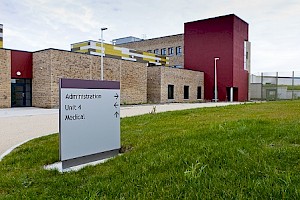Youth Justice
Ireland has a long history of poor responses to offending behaviour by children. A core strand to IPRT's work since its establishment in 1994 has been the promotion of a more effective youth justice system, with emphasis on non-custodial alternatives, diversion, early intervention and prevention strategies and programmes. Central to our work was ending the practice of detaining children in adult prisons, which was in breach of international human rights standards and a serious stain on Ireland's human rights record.
International human rights standards, and in particular the provisions of the UN Convention on the Rights of the Child, are clear that custody for children should only be used as a last resort and for the minimum required period of time. All efforts should be made to apply alternatives to detention to ensure that such a measure is only used in exceptional circumstances.
In Ireland, the Children Act 2001 recognizes the principle of detention as a last resort. The Act prohibits the imprisonment of children and the Criminal Justice Act 2006 makes provision for all children less than 18 years of age to be detained in Children Detention Schools. The detention school model is focused on a model of care, education, health and programmes that address offending, with improved outcomes for the young people, their communities and all of society. The Irish Youth Justice Service is responsible for the Children Detention Schools, within the Department of Children and Youth Affairs.
Following years of sustained advocacy by IPRT, along with many national and international bodies, in 2012 the detention of boys aged under 17 at St Patrick's Institution ended. In March 2017, a Ministerial Order ended the sentencing of children aged under 18 to adult prison in Ireland, and in April 2017, St. Patrick’s Institution was finally closed. Since September 2017 boys aged under 18 are no longer detained in the adult prison system.
IPRT continues to work towards progressive change in youth justice policies and practice, as well as engaging with wider policy and practice issues relating to youth justice, such as the provision of alternatives to detention, diversion and early intervention programmes.

Report published on the mental health needs of children in the care and youth justice systems
11th July 2013
The Children’s Mental Health Coalition has published a report identifying the imperative needs of children and young people in the care and youth justice systems in Ireland.
Latest inspection report on Children Detention Schools published
29th May 2013
HIQA has published its latest inspection report on the three Children Detention Schools at Oberstown, Lusk, Co. Dublin. It found positive improvements, but some issues remain.
Lack of detention facilities for children questioned by Children's Court Judge
12th May 2013
The Minister for Children and Youth Affairs was questioned by Ms Justice Ann Ryan, Dublin Children's Court, regarding the lack of detention facilities for children.
44 young offenders on 23-hour lock up in St. Patrick’s Institution
26th March 2013
Minister for Justice and Equality, Alan Shatter TD, has disclosed that 44 young offenders, including two 17 year old boys, are locked up 23 hours a day in St. Patrick's Institution.
Eng & Wales: Report published on children's experience of violence in custody
26th February 2013
The Children’s Rights Alliance for England has published a report as part of the Ending Violence against Children in Custody project, presenting findings of research carried out with children and young people with experience of custody.
2011 Annual Report on Garda Diversion Programme published
21st January 2013
The Minister for Justice, Equality and Defence, Alan Shatter TD, today published the 2011 Annual Report on the effectiveness of the Garda Diversion Programme.
NI:New research highlights the importance of ‘significant adults’ in the lives of children and young people in conflict with the law.
11th December 2012
In February 2012, the Northern Ireland Commissioner for Children and Young People (NICCY) commissioned a study into the impact which positive relationships with ‘significant adults’ can have on the lives of children and young people in conflict with the criminal justice system. The report was published today.
Report published on the implementation of National Youth Justice Strategy 2008-2010
31st October 2012
This month, the Irish Youth Justice Service published its report on the progress made in implementing the National Youth Justice Strategy 2008-2010.
Inspection report on Children Detention Schools at Oberstown
10th October 2012
HIQA report published on the inspection carried out on the Children Detention Schools at the Oberstown Campus in November 2011.
Inquiry on girls: From courts to custody (UK)
20th August 2012
Report by Howard League for Penal Reform suggests girls are 'pigeon-holed into a criminal justice system designed for the male majority'.




